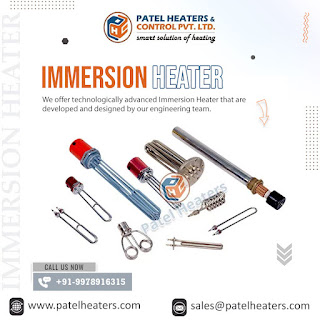Immersion Heater and Energy Efficiency - How to Reduce Heating Costs
In an era of growing concern over energy consumption and its environmental impact, finding ways to reduce heating costs has become a priority for individuals and industries. Immersion heater, commonly used to heat water in various applications, play a crucial role in this endeavour.
What is Immersion Heater?
Before delving into energy efficiency, it's essential to understand what heaters offered by Immersion Heater Manufacturers in India are and how they function. Heaters are electric heating elements typically placed directly into a liquid or gas to heat it. They consist of a heating coil or rod made of materials like stainless steel or copper, which are corrosion-resistant. When an electrical current passes through the heating element, it generates heat transferred to the surrounding medium.
The heaters are widely used in various applications, including domestic water heating, industrial processes, laboratories, and research facilities. They are known for their versatility and ability to heat liquids and gases quickly and efficiently. However, this convenience comes with energy consumption costs, making it essential to consider energy efficiency when using heaters.
The Impact of Immersion Heater on Heating Costs
Immersion Heater is known for their efficiency in heating liquids and gases, but their energy consumption can significantly impact heating costs, especially when used extensively. Here are some ways in which heaters affect heating expenses:
1. Electricity Consumption:
Heaters are typically powered by electricity, and the amount of electricity they consume directly correlates with the heating element's wattage and duration of use. The higher the wattage and longer the heater operates, the more electricity it consumes, increasing heating costs.
2. Heat Loss:
While heaters are effective at heating the surrounding medium, they could be more efficient in retaining heat. Some heat loss occurs during the heating process, especially in uninsulated systems. This means that even after the heater is turned off, there may be continued energy consumption to maintain the desired temperature.
3. Overheating:
Improperly sized or designed heaters can lead to overheating, which wastes energy and poses safety risks. Overheating can cause damage to the heating element and the liquid or gas being heated, resulting in increased repair and replacement costs.
4. Inefficient Controls:
The control system for heaters can impact energy efficiency. Suppose the controls are not properly calibrated, or there is no mechanism for adjusting the temperature based on actual need. In that case, the heater may operate at full capacity even when lower temperatures suffice.
Given these potential impacts on heating costs, it's clear that optimizing the use of heaters for energy efficiency is a worthwhile endeavor.
Strategies for Maximizing Energy Efficiency with Immersion Heater
- Proper Sizing: One of the first steps in maximizing energy
efficiency with heaters is selecting the right size for the intended
application. A heater that is too small may not effectively heat the
medium, leading to longer operating times and increased energy
consumption.
- Insulation: Insulating the container or system where the
heater is placed can significantly reduce heat loss. This insulation can
be in jackets, blankets, or foam materials, depending on the specific
application.
- Thermostatic Controls: Installing thermostatic controls or
temperature sensors that can accurately regulate the temperature of the
medium can prevent overheating and unnecessary energy consumption.
- Time Controls: Implementing timers or time-based controls can
be particularly useful in applications where heating is required
intermittently.
- Regular Maintenance: Proper maintenance of heaters is essential to ensure they operate efficiently. This includes cleaning the heating element, checking for signs of corrosion or damage, and replacing any faulty components promptly.




Comments
Post a Comment